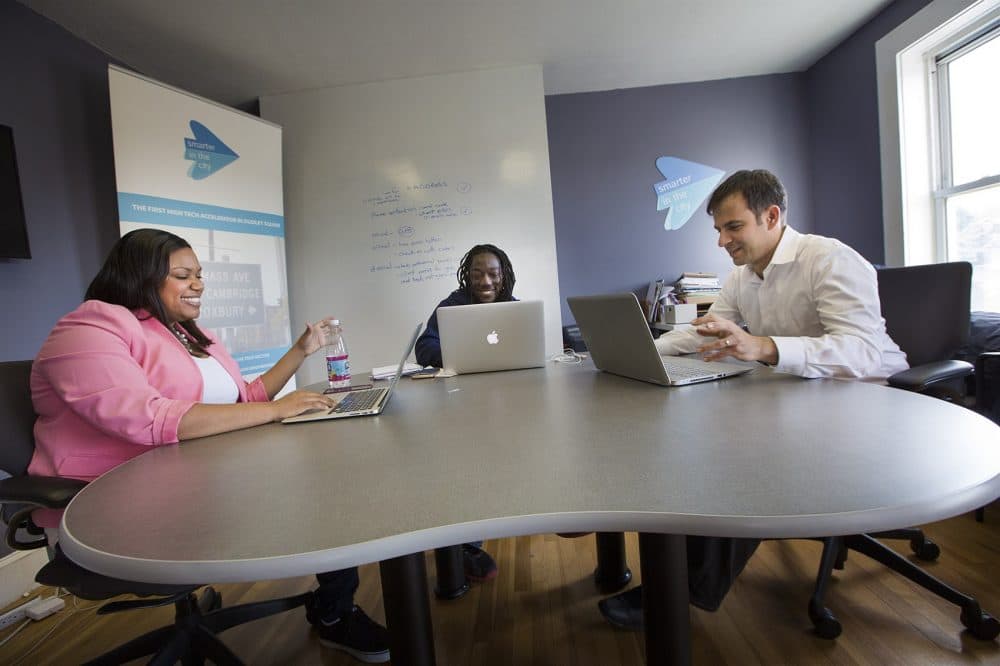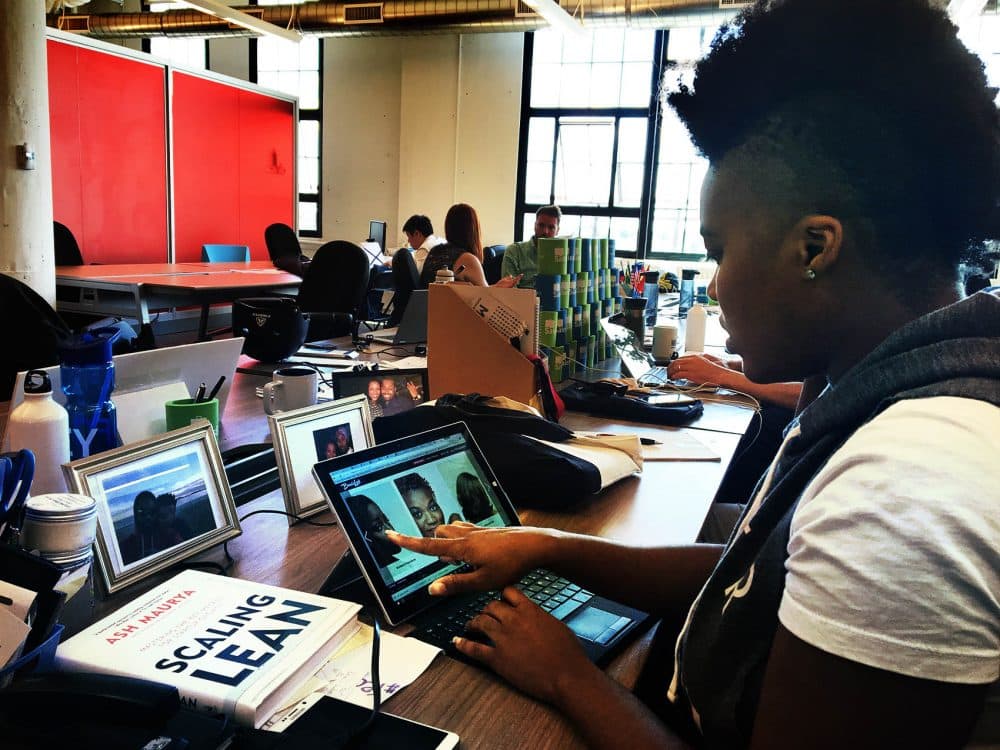Advertisement
A Rejuvenated Dudley Square Struggles With Changing Identity
Resume
He wasn't around to witness Dudley Square's economic heyday, but Gilad Rosenzweig knows the history. And now he's fighting for the restoration of the area as a commercial hub.
“Dudley has always been a business center of Boston,” Rosenzweig said in the conference room of the Dudley-based business accelerator he opened two years ago.
"Up until the '50s, [Dudley Square] was the second busiest business district in the city," he said. "Unfortunately it had about 40 years of disinvestment, and people left."
In recent years, the city has injected tens of millions of dollars into Dudley Square. Signs of urban decay persist amid myriad construction sites, with old buildings being reinvented as shining towers with new businesses on the ground floor.
And a small cluster of nonprofits and business accelerators in Dudley Square is trying to bring entrepreneurship to this inner city center, with hopes of developing Dudley into a first rate innovation hub.
Minority Representation In The Startup Scene
One of several accelerators there is run by Rosenzweig, an urban planner who lives in Cambridge and founded Smarter in the City two years ago. It’s a tech accelerator catering to what Rosenzweig calls "underrepresented minority” entrepreneurs, mostly black and Latino.
"This has been done in Kendall and in the Seaport and other parts of the city, but it was never attempted in the inner city — in Roxbury, in Dorchester,” he said.
There's no clear data on minority representation in Boston's incubators and accelerators, but many say the proportion is out of whack with the city's demographics. A national study by the Initiative for a Competitive Inner City found just 8 percent of business incubators focus on African-American entrepreneurs — about the same rate for Latinos — and insiders in Boston’s startup community say the city is roughly on par with the rest of the country.
Smarter in the City takes on five fledgling companies for five months at a time. The incoming crew includes a startup with a bookkeeping app for small businesses that deal in cash, and one with a website for finding rental housing without fees. At Smarter in the City, the businesses get workspace with fast Wi-Fi, mentorship from industry veterans, collaboration with other early stage entrepreneurs, and a gateway into the area's startup economy.
The Boston Foundation provides funding for Smarter in the City and other accelerators in Dudley Square. The foundation's Damon Cox says beyond racial justice, diversifying the tech industry is about income inequality in one of the most unequal cities in the country.
"When you look at the incredible, just mind-blowing statistics around the wealth gap, I look at this as being one of the great remedies to that,” Cox said.
One answer to the diversity question is for companies to recruit more people of color. But Smarter in the City takes the opposite approach.
“At the same time [there] needs to be an emphasis on new companies being created by members of communities of color, by women,” Rosenzweig said. "It has to be equitable at all levels."
Hurdles To Development
Rica Elysee got into Smarter in the City's last cohort with her company BeautyLynk, a website that links customers to at-home beauty services.
"Smarter has taught me a great thing about relationships, a great thing around thinking through my technology, and also building strategy and working with peers,” Elysee said.

Elysee, 30, is a Mattapan native and the daughter of Haitian immigrants. Smarter in the City was a stepping stone to get into a much larger accelerator, MassChallenge, where she's one of 128 entrepreneurs in this year’s cohort.
Asked if she would consider opening her business in Dudley Square some day, Elysee said she feels at home working in Roxbury. But after MassChallenge, she sees BeautyLynk going into a common workspace she can share with similarly sized companies, and that doesn’t exist yet in Roxbury.
"I need that opportunity to be able to brainstorm with other entrepreneurs that are also in the same stage as a company, and I don't feel like I would be able to get that in Roxbury at this time,” she said.
Elysee says Dudley needs more investment and resources if it's going to become the innovation hub so many are talking about. For a company like BeautyLynk, the true test is whether Dudley Square will provide the environment needed for the business to thrive.
Out With The Old, In With The New
The most visible symbol of change in Dudley Square is the newly renovated Bruce C. Bolling Municipal Building. The city put $115 million into the six-story building that opened in the spring of 2015. Towering over Dudley Station, its tenants include the central office of Boston Public Schools and the Roxbury Innovation Center. On the ground floor, a chic cafe and a burger joint cater largely to those who work upstairs.
To many, the renovation was a welcome update to a long-neglected square. But as new businesses open, others are struggling not to close. In business since 1968, A Nubian Notion, an Afrocentric gift shop and convenience store at the intersection of Dudley and Warren streets, plans to close in the months ahead.
Sharif Abdal-Khallaq is president of the company. He said the family is aging out of the business, but the change underway in Dudley Square was an important factor in the decision to close.
"By the same token there are other economic phenomena that also contributed to our moving out of that location: the transformation of neighborhoods, the gentrification of neighborhoods, the acquisition of properties, the improvement of those properties,” he said.
Abdal-Khallaq said rents are rising and the demographics of this historically black neighborhood are shifting. A Nubian Notion could open in another part of Roxbury, he said, but Dudley is no longer the place.
Some of Dudley's longtime residents are feeling the squeeze of rising rents and property values.
"You were born here, you grew up here, so you want to stay here in the community,” said Laura Hill, waiting for a bus at Dudley Station. "I know people 80 years old, that have been here all their lives, born and raised here in Roxbury. They don't wanna be pushed out. This is all they know."
Whether Dudley evolves into a tech hub powered by longtime residents, or another Boston neighborhood squeezing out its generational businesses and neighbors, that story will be told in the years ahead.
For Malia Lazu, president of Epicenter Community, another business accelerator in Dudley Square, the area is on its way to becoming an innovation hub. But it could come at the cost of gentrification if nascent local businesses are forced to compete for space with established businesses from outside the community.
“How do we mitigate [displacement] as much as possible? ... I don't think Boston is having that conversation in an open and honest way just yet,” Lazu said. "If you want to keep the indigenous people there then they have to have a way to make wealth as this wave comes in."
This segment aired on August 16, 2016.
